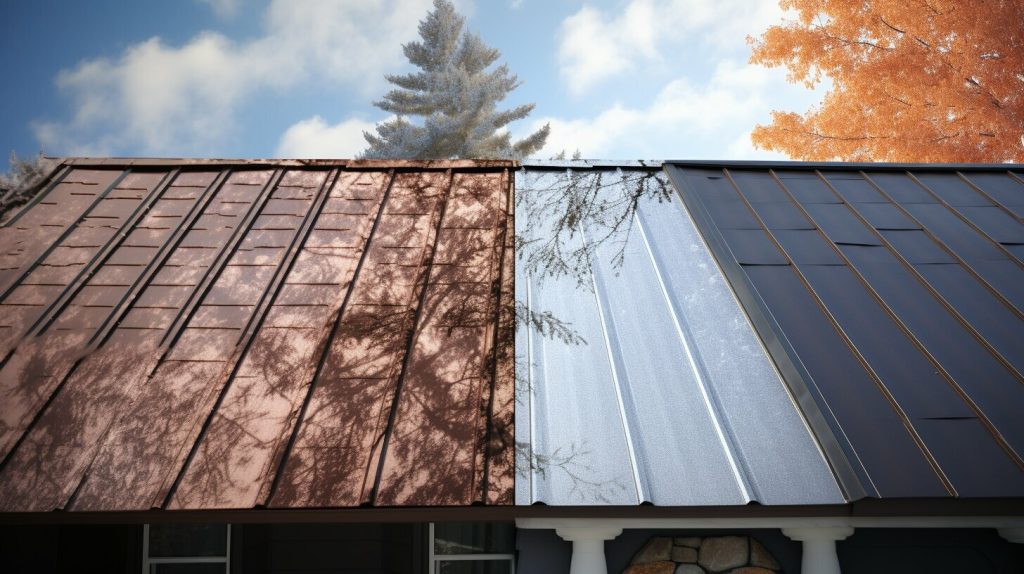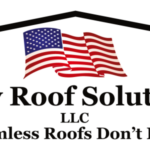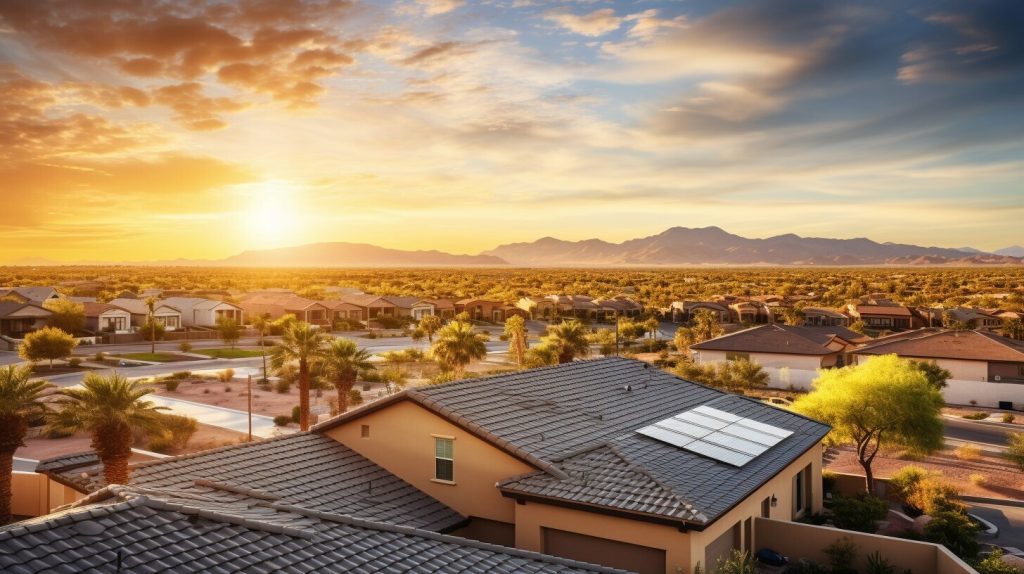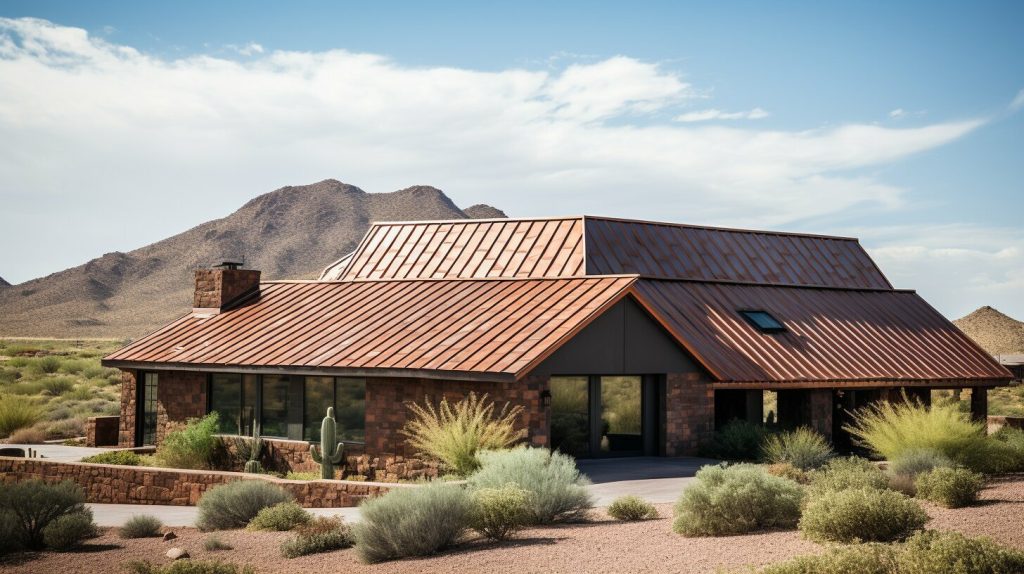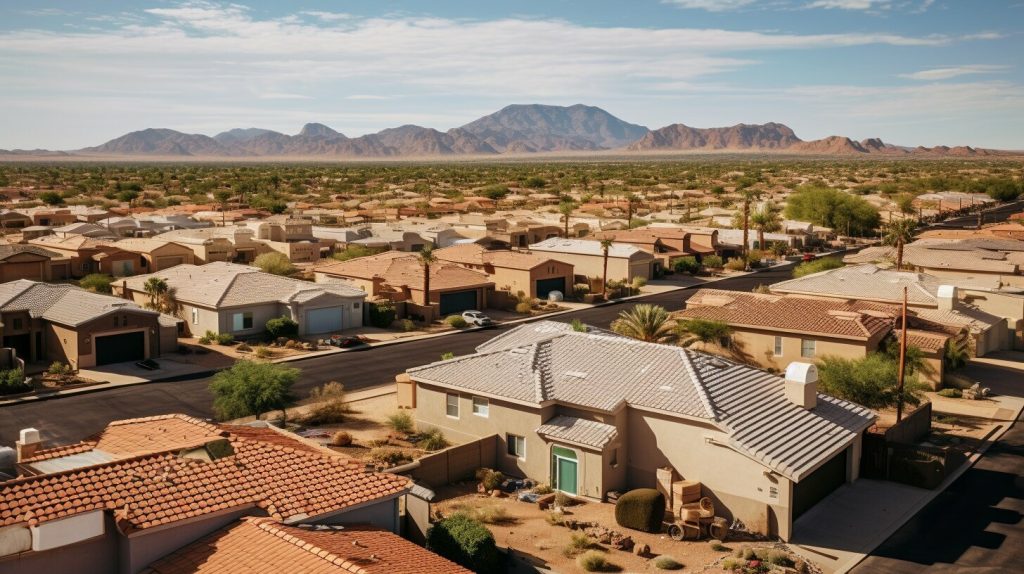When it comes to roofing options for your business, there are many factors to consider, including cost. The two most popular roof types are metal roofs and shingle roofs, but what is the cost difference between these options? In this article, we will explore the cost breakdowns, benefits, and durability of metal roofs and shingle roofs to help you make an informed decision for your roofing investment.
Key Takeaways:
- Metal roofs and shingle roofs are popular options for businesses looking for a durable roofing solution.
- The cost of a metal roof vs shingles can vary based on factors such as installation complexity, material type, and roof size.
- Understanding the specific cost breakdowns of metal roofs and shingles can help businesses make an informed decision for their roofing investment.
- In addition to cost, business owners should also consider the benefits and durability of each option when deciding between metal roofs vs shingle roofs.
Factors Affecting Roofing Costs
Before we jump into comparing the costs of metal and shingle roofs, it’s important to understand the factors that impact roofing costs. These factors will help you determine which type of roofing is best suited for your business. Here are some key cost factors to consider:
- Material Type: The type of material you choose for your roof will greatly impact the overall cost. Metal roofs tend to be more expensive than shingle roofs, but they also offer greater durability and longevity.
- Installation Complexity: The complexity of the installation process also affects the cost. Metal roofing installation requires specialized skills and tools, which can increase the total cost. Meanwhile, shingle roofs are relatively simple to install and require less labor, resulting in a lower overall cost.
- Roof Size: The size of your roof is another key cost factor to consider. Larger roofs will require more materials and labor, resulting in a higher overall cost.
- Location: The location of your business can also affect the cost of your roofing project. Factors such as accessibility, local weather patterns, and building codes can all impact the final cost.
Factors Affecting Metal Roof Costs
In addition to the factors mentioned above, there are also certain factors that specifically impact the cost of metal roofing:
- Material Quality: The quality of the metal material you choose will affect the overall cost. Higher quality materials tend to be more expensive, but also offer greater durability and lifespan.
- Coating: If you opt for a metal roof with a special coating, such as a reflective coating or rust-resistant coating, this will also impact the cost.
- Customization: Customizing your metal roof with unique colors, patterns, or shapes can increase the cost.
Factors Affecting Shingle Roof Costs
Similarly, there are also certain factors that specifically impact the cost of shingle roofing:
- Shingle Quality: The quality of the shingle material you choose will affect the overall cost. Higher quality shingles tend to be more expensive, but also offer greater durability and lifespan.
- Shingle Type: The type of shingle you choose can also impact the cost. For example, asphalt shingles tend to be the most affordable option, while wood or tile shingles can be more expensive.
- Color and Style: Customizing your shingle roof with unique colors or styles can increase the cost.
Now that you understand the key factors that impact roofing costs, you can make an informed decision about which type of roofing is the best fit for your business. In the next sections, we’ll discuss the specific costs associated with metal and shingle roofs, as well as the long-term benefits of each option.
Metal Roof Costs
When it comes to metal roofs, the cost can vary depending on a few different factors. The average cost per square foot for the materials can range from $5 to $15, with higher-end metals such as copper or zinc costing up to $30 per square foot. Installation costs can also fluctuate based on factors like roof complexity and location, with a range of $3 to $10 per square foot.
For commercial metal roofing, the cost can be a bit higher than residential due to the need for larger scale materials and installation. However, the longevity of a metal roof can make it a worthwhile investment for businesses. A properly installed metal roof can last up to 50 years or more, compared to the 15 to 20 years of a typical shingle roof.
| Cost Factors | Average Cost |
|---|---|
| Metal Roof Materials | $5 to $30 per sq. ft. |
| Installation Costs | $3 to $10 per sq. ft. |
| Total Cost | $8 to $40 per sq. ft. |
It’s important to note that while the initial cost for a metal roof may be higher than that of a shingle roof, the long-term cost benefits can make it a cost-effective choice in the end. Metal roofs are durable and energy-efficient, which can save businesses money on heating and cooling costs over time.
If you’re considering a metal roof for your business, it’s essential to work with a reputable and experienced installer. Proper installation is crucial for the longevity and performance of your new roof, so be sure to do your research and choose a qualified professional.
Shingle Roof Costs
Now we come to the cost of shingle roofs. Shingle roofs are a popular choice for commercial buildings due to their affordability, versatility, and ease of installation. The cost of shingles varies depending on the type of material and quality of the product. On average, shingle roof cost ranges from $3.50 to $5.50 per square foot. However, the cost can go up to $7.50 per square foot for premium quality shingles.
Installation for shingle roofs is relatively simple, which makes it quicker and therefore less expensive than metal roofs. The cost of shingle roof installation can range from $3.50 to $6.50 per square foot. The total cost of shingle roofing also depends on the size of the roof, and the complexity of the installation process, such as the number of roof layers.
It’s important to note that shingle roofs have a shorter lifespan compared to metal roofs, with an average lifespan of 15 to 30 years. This means that although shingle roofs may be cheaper upfront, they might require more repairs and replacements over time, which could increase overall costs in the long run. Additionally, shingle roofs require regular maintenance, such as cleaning gutters and inspecting for damages.
When evaluating the cost of shingle roofs, business owners should consider the trade-off between initial cost and long-term maintenance. Although shingle roofs may be a more affordable option for the short term, the cost of repairs and replacements may add up over time, making them less cost-effective in the long run.
Benefits and Durability Comparison
Now that we have discussed the costs associated with metal and shingle roofs, let’s examine the benefits and durability of these options.
Metal Roof Benefits
One notable advantage of a metal roof is its durability. Metal roofs can last up to 50 years or more, which is significantly longer than shingle roofs. Moreover, metal roofs are energy-efficient and can help reduce your heating and cooling costs. They come in a variety of colors and styles, providing an aesthetic appeal that complements any building design. Additionally, metal roofs are fire-resistant and can withstand extreme weather conditions such as high winds, hail, and heavy snowfall.
Shingle Roof Benefits
While shingle roofs do not last as long as metal roofs, they are a more affordable option. Shingle roofs are easy to install and require minimal maintenance. They come in a variety of colors and styles, providing an aesthetic appeal that complements any building design. Moreover, shingle roofs absorb less heat than metal roofs, which can help reduce your cooling costs in warmer months.
Metal Roof Durability
Metal roofs are known for their durability, as they can last up to 50 years or more. They are resistant to damage caused by hail, high winds, and heavy snowfall. Additionally, metal roofs are fire-resistant and do not rot or attract insects. Metal roofs are an excellent option for buildings in areas with harsh weather conditions.
Shingle Roof Durability
Shingle roofs typically last around 15-25 years, depending on the quality of materials used and maintenance. They are prone to damage caused by high winds, hail, and heavy snowfall. Shingle roofs may also experience moss growth, which can lead to rot and leaks if left untreated. Regular maintenance is necessary to ensure the longevity of shingle roofs.
Overall, both metal and shingle roofs have their advantages and disadvantages. Metal roofs are more durable, energy-efficient, and long-lasting, while shingle roofs are more affordable and require less maintenance. We recommend considering your specific needs, budget, and long-term goals when deciding between a metal roof or shingle roof for your business.
Conclusion
After examining the cost comparison between metal roofs and shingle roofs, considering the factors that influence roofing costs, and exploring the specific costs associated with each option, we have come to our final verdict.
Which roof is better?
Both metal roofs and shingle roofs have their advantages and disadvantages. Metal roofs offer long-term cost savings due to their durability, energy efficiency, and low maintenance requirements. However, they come with a higher initial installation cost. Shingle roofs are more affordable upfront and offer a variety of styles, but they require more maintenance and have a shorter lifespan.
Cost-effective roofing option
Ultimately, the best roofing option for your business depends on your specific needs and budget. If you are looking for a roofing option that offers long-term savings and durability, a metal roof may be the more cost-effective option. If you have a lower budget and prioritize aesthetics over long-term savings, a shingle roof may be a more suitable option.
It’s important to consider all factors and make an informed decision that aligns with your business goals. We hope this article has provided valuable insights to help you make the best decision for your roofing investment.
FAQ
How much does a metal roof cost compared to a shingle roof?
The cost of a metal roof can vary depending on factors such as the size of the roof, the type of metal used, and the complexity of the installation. Generally, metal roofs tend to be more expensive upfront compared to shingle roofs. However, metal roofs offer long-term cost benefits due to their durability and energy efficiency.
What factors affect roofing costs?
Several factors can influence roofing costs, including the type of material used, the complexity of the installation, the size of the roof, and the location. These factors can vary depending on whether you choose a metal roof or a shingle roof.
How much does a metal roof cost?
The cost of a metal roof can range from $7 to $14 per square foot, depending on factors such as the type of metal used, the complexity of the installation, and the location. It’s important to consider the long-term cost benefits of a metal roof, including energy efficiency and durability.
How much does a shingle roof cost?
The cost of a shingle roof can vary depending on factors such as the type of shingles used, the size of the roof, and the complexity of the installation. Generally, shingle roofs are more affordable upfront compared to metal roofs. However, it’s important to consider the lifespan and maintenance requirements of shingle roofs when evaluating their long-term costs.
What are the benefits and durability of metal roofs compared to shingle roofs?
Metal roofs offer several benefits, such as energy efficiency, aesthetic appeal, and noise reduction. They are also highly durable and can withstand extreme weather conditions. On the other hand, shingle roofs are more commonly used and offer a wide range of color options. They have a moderate lifespan and require regular maintenance. The choice between metal and shingle roofs ultimately depends on your specific needs and preferences.
Which roof is the more cost-effective option?
The cost-effectiveness of a metal roof or a shingle roof depends on various factors, including your budget, long-term goals, and specific needs. While metal roofs may have a higher upfront cost, they offer long-term cost benefits due to their durability and energy efficiency. Shingle roofs are more affordable initially but may require more frequent maintenance and have a shorter lifespan. Consider your priorities and consult with a roofing professional to determine the best option for your business.

